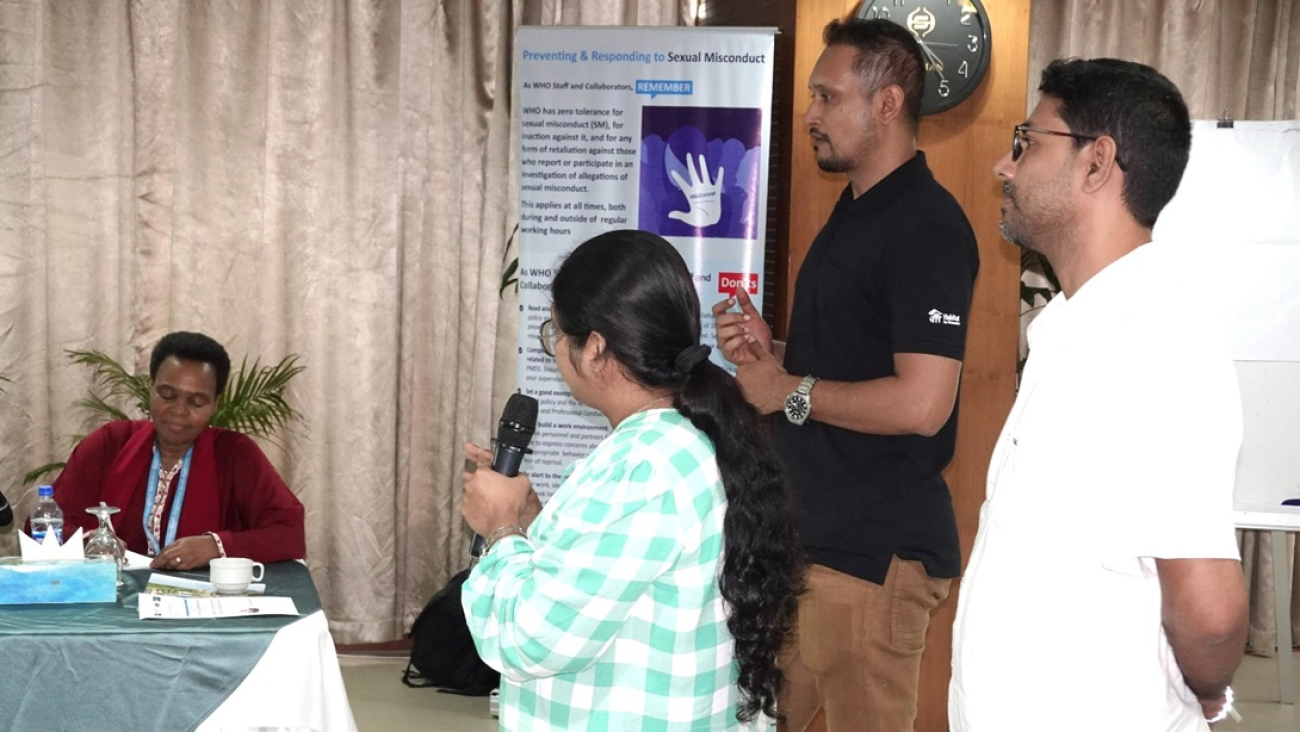Empowering Humanitarian Workers: WHO Mainstreams PSEA in Cox’s Bazar

14 October 2024
The World Health Organization (WHO), in collaboration with the Prevention of Sexual Exploitation and Abuse (PSEA) Network in Cox’s Bazar, conducted a comprehensive workshop with an aim to integrate PSEA into humanitarian and emergency response services. This initiative, coordinated by the WHO PRSEAH Coordinator in Bangladesh, is part of WHO’s ongoing efforts to enhance the protection and well-being of Rohingya refugees and host communities in Cox’s Bazar.
The Rohingya refugee camps in Cox’s Bazar, home to nearly one million refugees, are the largest in the world and a serve as a poignant reminder of the ongoing humanitarian crisis. These camps encounter numerous challenges, including natural disasters and disease outbreaks, which further exacerbate the vulnerability of the refugee population.
Sexual exploitation and abuse (SEA) are pervasive issues in such settings, making the integration of PSEA measures crucial for safeguarding the rights and dignity of all beneficiaries.
The training, held on 9 and 14 October 2024, focused on equipping Sector Focal Points from the Water, Sanitation and Hygiene (WASH) and Shelter-Camp Coordination and Camp Management (SCCCM) with the knowledge and skills necessary to prevent and respond to SEA effectively.
“This training initiative by WHO as the Health Sector lead agency, aims to strengthen the knowledge of Sector Focal Points on sexual, exploitation and abuse issues in Rohingya Refugee camps. By prioritising SCCCM and WASH Focal Points, we ensure those at the forefront of service delivery are well-equipped to safeguard beneficiaries from any form of SEA–” Pudentienne MUSABYIMANA, WHO Bangladesh PRSEAH Coordinator.
The primary objective of the training was to enhance the capacity of Sector Focal Points to integrate PSEA into their respective sectors. Specific goals included deepening participants’ understanding of SEA, clarifying roles and responsibilities, and promoting a survivor-centred approach. By the end of the workshop, participants had gained comprehensive knowledge of SEA concepts, the importance of prevention and response, and the procedures for reporting and addressing SEA incidents.
“The training aims to equip participants with a comprehensive understanding of sexual exploitation and abuse, ensuring they can effectively prevent and respond to these issues. Our goal is to create a safer and more respectful environment for all beneficiaries–” Rajib Rahman, Trainer, PSEA Network, Cox’s Bazar.
WHO’s commitment to a zero-tolerance policy towards SEA is reflected in this training initiative. By enhancing the capacity of humanitarian workers, WHO aims to ensure that all service delivery in the camps is conducted in a safe and protective environment. This training represents a significant step toward achieving the goals outlined in the Joint Response Plan (JRP) for the Rohingya Humanitarian Crisis 2024, particularly in promoting a safe and protective environment for all.
“The training has significantly deepened my understanding of sexual exploitation and abuse. These insights will help foster a safer and more respectful working environment within my organization and raise awareness to protect our beneficiaries–” Md Habibur Rahman, Project Assistant- Hygiene WASH Project, IOM.
The success of this training underscores the importance of ongoing capacity-building efforts in humanitarian settings. In collaboration with the PSEA Network and other partners, WHO will continue to provide support and training to ensure that PSEA measures are effectively integrated across all sectors. Future training sessions will be expanded to include other sectors, further strengthening the overall response to SEA among Rohingya refugees in Cox’s Bazar.





